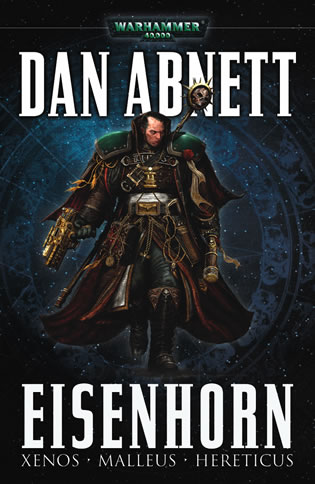
Almost all of my players (and past players) have heard me rave about the book Eisenhorn.
As far as an introduction into the Warhammer 40,000 universe, I can think of no better. Essentially, the Omnibus describes the exploits of an Imperial Inquisitor. As I understand it, author Dan Abnett wrote Eisenhorn as a novel that could show readers how an Inquisition-based campaign might run. It's one of my favorite novels of all time. The best part of this book series is, however, that you don't need to know anything about the 40k universe to enjoy it. My wife, who is a non-gamer read it and loved it. So that's saying something.
Well, that's great and all for Dark Heresy. But what about Rogue Trader, however? Well, there is Rogue Star, which is a dedicated Rogue Trader novel. I don't know too much about it, but I may have to check it out.
Bu the novel series that I've taken a lot of inspiration from for my campaign is The Saint, also by Dan Abnett. The Saint is an omnibus of four novels, which are part of the Gaunt's Ghosts series of novels. The Gaunt's Ghosts series of novels follows the exploits of a particular division of the Imperial Guard. Basically, these stories read like Band of Brothers mixed with Horatio Hornblower in the 40k universe.
Now, this omnibus is a series of novels about the Imperial Guard, not Rogue Traders. But reading it, I really saw how someone could use these stories as an inspiration for a campaign involving the large scope of Rogue Trader. The Gaunt's Ghost stories features a large cast of characters. The main character, Ibram Gaunt, is a man who is in charge of managing all of them. While the over-arching plot is a massive crusade, the true drama is the interplay of the characters, how they relate, and how they change each other. It gave me a lot to think about in terms of what might happen on a Rogue Trader ship.
In the Gaunt's Ghosts stories, a single private can do something which alerts the entire course of the plot or battle, for which they are sometimes recognized and sometimes not. Sometimes survival is just enough. But it got me thinking about how to run Rogue Trader in my mind. It got me thinking about how the crew aboard the ship is going to react to each and every event.
For example, what if different and important crew members develop romances between each other? What if there is a love triangle? What about a love triangle that is totally outside of the player characters' circle, but they have to resolve it in order for the ship to run properly? What if there are rivalries or vendettas between the various NPCs on the ship? What if a mystery breaks out aboard the ship? For example, what if one crew member murders another? What if it was for damn good reason? What if one of the minor crew members turns out to be a heretic? What about a latent psyker?
All of these things also make me consider another kind of Rogue Trader campaign. What about a Rogue Trader campaign that was more intimate and gritty? If you wanted to play a Rogue Trade game that was a lot more like Battlestar Galactica, for example, you totally could. That kind of Rogue Trader campaign would be much more like a Shakespearean tragedy. But I digress.
To give a quick review of The Saint, the omnibus is divided up into four novels. Each is a quick and easy read. The first book, Honor Guard is basically an action-packed battle scene with some battlefield drama and politics thrown in. It's the weakest of the four, but still really worth it. The second, The Guns of Tanith, is more about a battle and then stealth insertion. Here, the characters become much more developed and we see their relationships grow and change. Straight Silver is perhaps the best of the four, being not only the most character-driven of all of the novels, but a fantastic science-fiction "What if?" Essentially, the novel asks, what would happen if 21st century Army Rangers went into the front lines of World War I? What would happen and how do those things interact when modern warfare is introduced to archaic attrition warfare? Finally, Sabbat Martyr gives a very satisfying conclusion to the series, full of "Hell yes!" and "Finally!" moments as well as some real tragedy.







